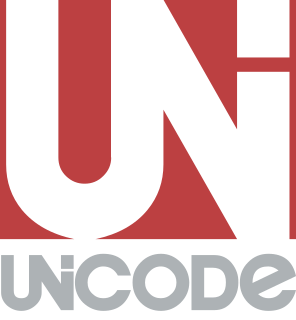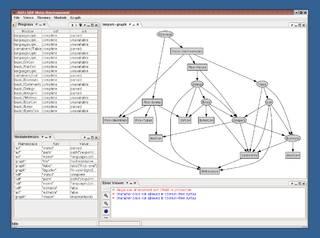| Stable release | 3.7 |
|---|---|
| Preview release | 4-beta.4 [1] |
| Written in | Java |
| Platform | Java Virtual Machine |
| Type | Parser/scanner generator |
| License | GNU Lesser General Public License |
| Website | http://www.sablecc.org/ |
SableCC is an open-source compiler generator (or interpreter generator) in Java. Stable version is licensed under the GNU Lesser General Public License (LGPL). Rewritten version 4 is licensed under Apache License 2.0.

Open-source software (OSS) is a type of computer software in which source code is released under a license in which the copyright holder grants users the rights to study, change, and distribute the software to anyone and for any purpose. Open-source software may be developed in a collaborative public manner. According to scientists who have studied it, open-source software is a prominent example of open collaboration. The term is often written without a hyphen as "open source software".

Java is a general-purpose computer-programming language that is concurrent, class-based, object-oriented, and specifically designed to have as few implementation dependencies as possible. It is intended to let application developers "write once, run anywhere" (WORA), meaning that compiled Java code can run on all platforms that support Java without the need for recompilation. Java applications are typically compiled to bytecode that can run on any Java virtual machine (JVM) regardless of computer architecture. As of 2016, Java is one of the most popular programming languages in use, particularly for client-server web applications, with a reported 9 million developers. Java was originally developed by James Gosling at Sun Microsystems and released in 1995 as a core component of Sun Microsystems' Java platform. The language derives much of its original features from SmallTalk, with a syntax similar to C and C++, but it has fewer low-level facilities than either of them.

The GNU Lesser General Public License (LGPL) is a free-software license published by the Free Software Foundation (FSF). The license allows developers and companies to use and integrate a software component released under the LGPL into their own software without being required by the terms of a strong copyleft license to release the source code of their own components. However, any developer who modifies an LGPL-covered component is required to make their modified version available under the same LGPL license. For proprietary software, code under the LGPL is usually used in the form of a shared library, so that there is a clear separation between the proprietary and LGPL components. The LGPL is primarily used for software libraries, although it is also used by some stand-alone applications.
Contents
SableCC includes the following features:
- Deterministic finite automaton (DFA)-based lexers with full Unicode support and lexical states.
- Extended Backus–Naur form grammar syntax. (Supports the *, ? and + operators).
- LALR(1) based parsers.
- Automatic generation of strictly-typed abstract syntax trees.
- Automatic generation of tree-walker classes.

In the theory of computation, a branch of theoretical computer science, a deterministic finite automaton (DFA)—also known as deterministic finite acceptor (DFA), deterministic finite state machine (DFSM), or deterministic finite state automaton (DFSA)—is a finite-state machine that accepts or rejects strings of symbols and only produces a unique computation of the automaton for each input string. Deterministic refers to the uniqueness of the computation. In search of the simplest models to capture finite-state machines, Warren McCulloch and Walter Pitts were among the first researchers to introduce a concept similar to finite automata in 1943.

Unicode is a computing industry standard for the consistent encoding, representation, and handling of text expressed in most of the world's writing systems. The standard is maintained by the Unicode Consortium, and as of June 2018 the most recent version, Unicode 11.0, contains a repertoire of 137,439 characters covering 146 modern and historic scripts, as well as multiple symbol sets and emoji. The character repertoire of the Unicode Standard is synchronized with ISO/IEC 10646, and both are code-for-code identical.
In computer science, extended Backus-Naur form (EBNF) is a family of metasyntax notations, any of which can be used to express a context-free grammar. EBNF is used to make a formal description of a formal language which can be a computer programming language. They are extensions of the basic Backus–Naur form (BNF) metasyntax notation.



